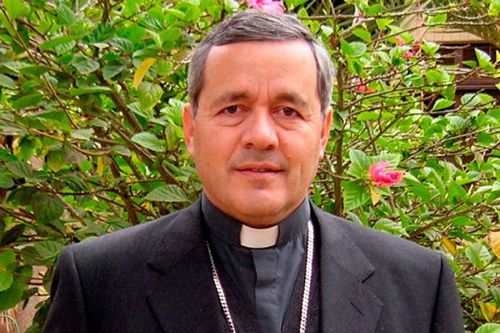A group of protesters attempted to stop the installation of Bishop Juan Barros Madrid as the new bishop of Osorno in southern Chile, pushing the bishop and throwing objects at him during the March 21 Mass. The protestors accuse Bishop Barros of covering up sexual abuse committed by Father Fernando Karadima. The bishop has repeatedly denied it. The story was picked up this weekend by international news media. Here are some keys to understanding what has happened since Jan. 10 of this year, when Pope Francis named Bishop Juan Barros as the new bishop of Osorno: 1. Who is Fernando Karadima Farina? Father Karadima fostered the vocation of some 40 priests, including Bishop Juan Barros, who decades ago belonged to Karadima’s closest circle of friends. When reports of sexual abuse and other scandal surrounding Karadima surfaced, Bishop Barros, like a number of other prelates, at first did not believe the accusations. The judge in the civil case dismissed the charges because the alleged abuse was too far in the past. Nevertheless, in February 2011, the Congregation for the Doctrine of the Faith at the Vatican completed its own investigation and declared 84-year-old Karadima guilty. He was sent to a life of solitude and prayer. The news of the sentence surprised bishops, priests and lay people who viewed the priest as a role model and considered the initial accusations as an attack on the Church. 2. Juan Carolos Cruz and the accusers Three of Karadima’s reported victims are accusing Bishop Barros of covering up the priest’s abuses. The accusations do not agree with the investigation carried out by the Vatican. Juan Carlos Cruz is the most well known of the accusers. He lives in the United States and is often asked by national and international news media for comments on what is happening in the Chilean Church. After Bishop Juan Barros was appointed as Bishop of Orsono, Cruz told CNN Chile that the Chilean Episcopal Conference and Pope Francis were giving Karadima’s victims “a slap in the face.” This has created international media attention. 3. Bishop Barros’ Defense Bishop Juan Barros and three other bishops close to Karadima supported the decision of the Holy See in April of 2011 and denied having known about his double life. They declared in a statement that “with great sorrow we have accepted the sentence declaring him guilty of serious offences condemned by the Church. Like so many, we learned about this situation and its diverse and multiple effects with deep astonishment and pain.” In a letter addressed to the faithful of the Osorno diocese days before his installation, Bishop Barros reiterated that “I never had any knowledge of any accusation concerning Father Karadima when I was the Secretary for Cardinal Juan Francisco Fresno and I never had any knowledge nor did I even imagine such grave abuses as this priest committed against his victims. I neither approved nor participated in those actions.” “The deep pain that continues to affect the victims for long years profoundly hurts me. And I reiterate along with the whole Church that there is no place in the priesthood for those that commit those abuses,” he added. Before taking up his responsibility as the Bishop of Osorno on March 21, 2015, the prelate reiterated that he was not linked to the priest’s abuses. “I am telling you, before God who is listening to us, it did not cross my mind that these things were going on. I would not have accepted it for any reason, and I am not a friend of Fernando Karadima,” he stated. He added that before the Vatican convicted him in 2011, “I was already becoming distant from him. Of course I had been close, but I was already becoming distant from him, not because I knew about these questions of the accusations but because he became ill tempered. I never knew about these very tragic things. The pain of the victims hurts me enormously, I pray for those that carry this pain with them today.” Before being the bishop of Osorno, Bishop Barros was the bishop for the Chilean military for almost 11 years, Bishop of Iquique for four years and Auxiliary Bishop of Valparaiso for five years. During all this time, his ministry had not been questioned. 4. The Protests in Osorno On the day Bishop Barros was installed, dozens of people, including non-Catholics, entered the Cathedral of Osorno with banners and black balloons to protest against the prelate. Large groups inside the church held white balloons and banners in support of the bishop. The media has publicized a letter signed by priests and deacons, as well as a letter from the Congregation of the Sacred Heart signed by their provincial Father Alex Vigueras, demanding the resignation of the prelate. In response, the Permanent Committee of the Chilean Episcopal Conference issued a March 18 statement expressing their “support, in a spirit of faith and obedience, for Pope Francis who has nominated Bishop Barros as bishop of the Diocese of Osorno.” 5 . Other interests? The media coverage on Bishop Barros’ appointment as Bishop of Oserno is taking place in the midst of the debate on legalizing abortion as well as bills on euthanasia and homosexual unions in Chile. The Church is one of the few voices that is speaking out against these proposals. In this context, 51 congressional representatives sent a letter to the Vatican questioning the appointment, some of whom are close to Cruz. This has led to some speculation that those advocating legal and social changes are using the Karadima case and his former friendship with Bishop Barro to discredit the Church in this debate.

